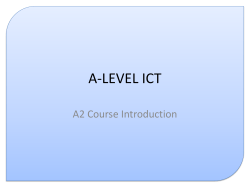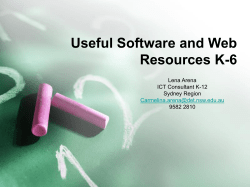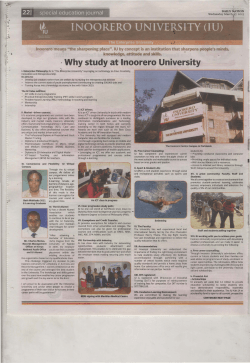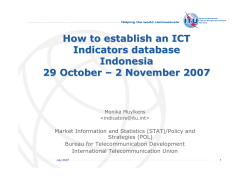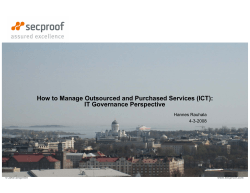
Herts ICT Team
Herts ICT Team Objectives for the session • To explore if, or when ICT should be used in Primary Science • To review hardware, software and resources which could usefully support learning in science Should we use ICT? The National Curriculum and Strategy documents make specific references to how ICT can be used to support teaching and motivate children’s learning. However… • Planning for the use of ICT should always start from the learning objectives for the lesson. • Will using ICT will make the teaching and learning of these objectives: Easier, Better or just Different. Use ICT if the content: • • • • directly relates to the Science objectives enhances the Science lesson supports good teaching in Science improves the children's learning in Science If the above do not apply, DON’T use ICT! Ways that ICT can support Science teaching • As a tool for modelling ideas and strategies • To demonstrate, explain and question • To stimulate discussion • To invite predictions and interpretations of what is displayed • To ask individual children to give an instruction or a response. ICT approaches in Science at KS2 • • • • • • Capturing scientific data Simulating or modelling a situation Recording experiments Gathering information Developing and sharing ideas Presenting findings and conclusions Using ICT in Science • • • • • The Digital Microscope Digital cameras Ecolog data logging device Herts grid- ICT in science web site Other resources Using ICT in Science The Digital Microscope • All primary schools in England were given an Intel Play Microscope as part of the Year of Science. • The microscope links to a computer showing the magnified images on the screen or interactive white board. Using ICT in Science • • • • • • The Digital Microscope allows children to view magnified objects easily has possible uses beyond an ordinary microscope extends children’s ICT skills is portable and can be used to view most objects is great fun to use and very motivating has a presentational elements allowing children to create video clips, special effects and store images. Using ICT in Science Digital Cameras • Recording experiments eg. sun position in the sky; changes in growth; changes in materials • Pictures of objects for labelling eg. components of electrical circuits • Pictures to stimulate discussion / written annotation eg: teeth; food; habitats Using ICT in Science Datalogging helps children to: • ask questions, predict and hypothesise • observe, measure and record, and manipulate variables • interpret results and evaluate scientific evidence • present and communicate their findings in a variety of ways. Using ICT in Science Datalogging advantages: Ability to collect quantitative data Faster recording of multiple readings freeing up time for discussion and analysis Pupils of all abilities able to record data accurately and plot graphs using the automatic graphing function. Measure light and sound levels Measure quantities over long periods of time. Using ICT in Science Datalogging disadvantages: Setting up the equipment Learning how to use the software What to do when it goes wrong Using ICT in Science The Hertfordshire Grid • The Grid now has linked activities to each QCA Science unit www.thegrid.org.uk – click Curriculum, ICT, Primary Subject Support, Science Using ICT in Science The Hertfordshire Grid: a few examples ... http://www.welltown.gov.uk/school/dining.html http://www.uhrad.com/kids/animals.htm http://www.thegrid.org.uk/learning/science/teachin g/ks1-2/index.shtml#y5 http://commtechlab.msu.edu/sites/dlcme/zoo/zdcmain.html Websites for Science A website for graphics: www.angelsoft.co.uk Two more worth looking at: www.howstuffworks.com www.brainpop.com Lots more in your pack. Using ICT in Science Other resources: • Electrical circuits • Powerpoint 1 • Powerpoint 2 • Powerpoint 3 Time to explore ...
© Copyright 2025

